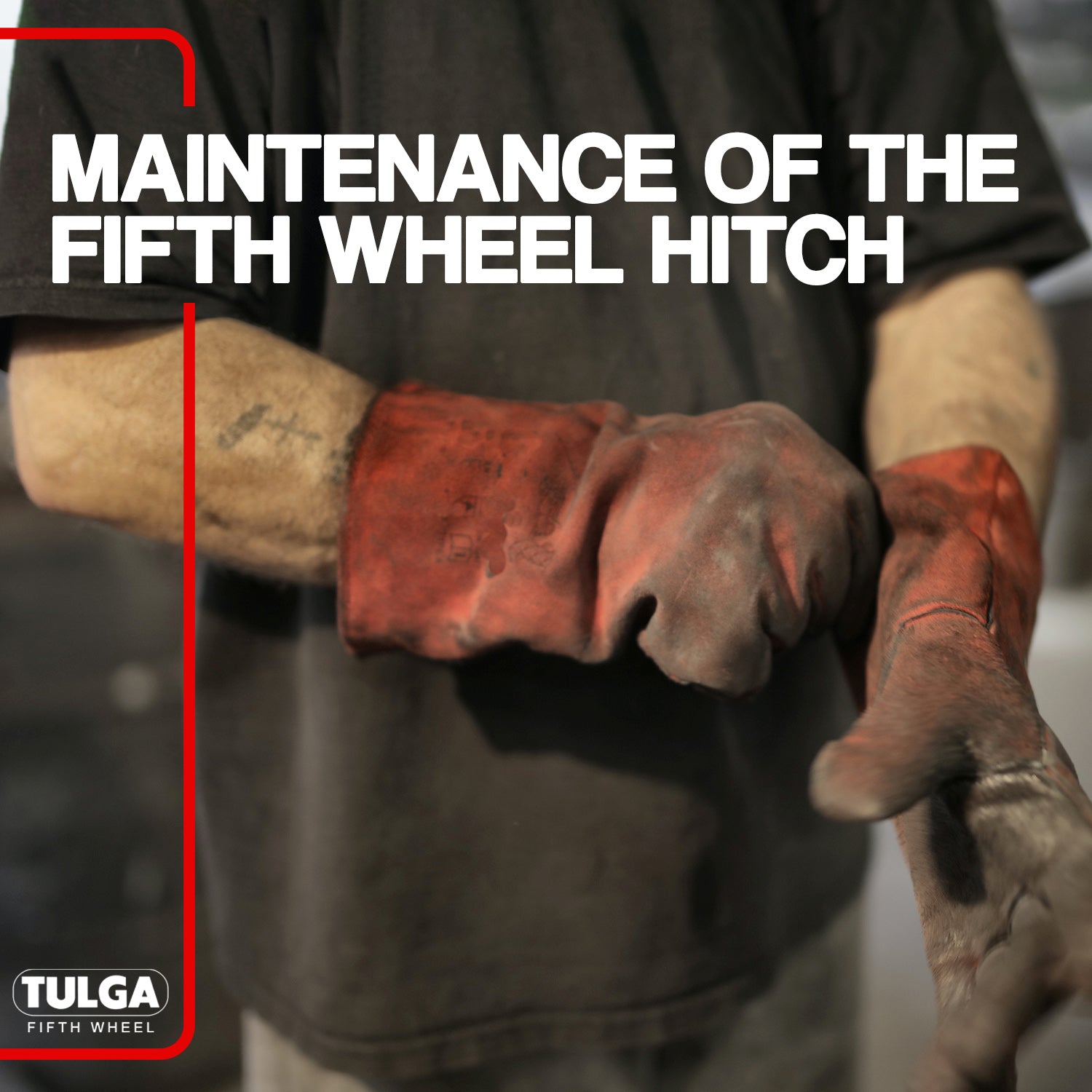Call (888) 611 2366
Support@tulgafifthwheel.com
Call (888) 611 2366
Support@tulgafifthwheel.com


Fifth wheel hitches must be maintained regularly, safely, and durably. Although these hitches are meant to function at their best when towing large loads, high loads and rough roads can eventually cause wear and tear. Frequent maintenance saves you money and ensures a safer driving experience by enabling the early detection of potential problems and preventing unplanned breakdowns.
You must constantly inspect and repair your fifth wheel hitch to ensure the safety of other drivers as well as yourself when driving. This keeps it operating at peak efficiency, increases its longevity, and guarantees everyone using the road is safe. To maintain the best possible condition and ensure the performance of your fifth wheel hitch, there are some procedures you must follow.
By following these steps, you can travel comfortably. Let's explore these steps together.

Understanding the components of a fifth wheel hitch is important for the proper maintenance and operation of this transport piece. Recognizing the main components of a fifth wheel hitch (hitch head, jaw mechanism, locking bars, and mounting rails) allows you to comprehend how each part functions and interacts with each other. With this knowledge, you can improve your ability to predict potential failures and apply the appropriate maintenance procedures. For maintaining regular upkeep and good operation, each component must be regularly checked and adjusted as needed. Knowing how the parts work together and affect the overall performance of your vehicle is essential if you want your fifth wheel hitch to be safe and durable:
Hitch Head: This is the main body of the fifth wheel hitch, typically housing the jaw
mechanism and providing the surface (skid plate) on which the trailer kingpin pivots. It plays a central role in absorbing the weight of the trailer and distributing it evenly across the towing vehicle.
Jaw Mechanism: Located inside the hitch head, the jaw mechanism is responsible for locking around the trailer’s kingpin to secure it in place. There are different types of jaws—single-jaw, dual-jaw, or slide-bar mechanisms—all of which affect how tightly the hitch holds thekingpin and how much movement is allowed during towing.
Locking Bars: These bars serve as an additional safety layer by physically securing the jaw
mechanism once it has closed around the kingpin. They help prevent accidental
disengagement, especially during bumpy rides or sharp turns.
Mounting Rails: Installed in the truck bed, these rails are what anchor the entire hitch
assembly to the towing vehicle. They ensure the hitch stays firmly in place, distributing the
trailer’s load and resisting torque during travel. There are both industry-standard base rails and custom-fit mounting options, depending on the vehicle model.
Regular maintenance of your fifth wheel hitch is essential to ensure safe, efficient, and reliable towing. Over time, exposure to heavy loads, rough terrain, and environmental factors like moisture and debris can lead to wear, corrosion, and loosening of critical components. By performing routine inspections and upkeep, you can detect early signs of damage, prevent mechanical failure, and avoid costly repairs or dangerous road situations. Proper maintenance not only protects your investment but also ensures the safety of your passengers and other drivers. Simply put, a well-maintained hitch performs better, lasts longer, and gives you peace of mind on every journey.
By following these steps, you can travel comfortably. Let's explore these steps together.
Lubrication is essential for reducing friction between the kingpin and skid plate, ensuring smooth and safe towing. Start by cleaning the contact surfaces to remove old grease and debris. Then, apply a thin layer of high-quality grease—such as lithium-based or moly grease—on the skid plate, kingpin, and jaw surfaces. Avoid over-greasing, which can attract dirt. Reapply lubricant every 1,000 miles, before long trips, or after washing. Regular lubrication extends the life of your hitch and prevents wear-related issues.
For optimal performance, use heavy-duty greases designed for high-pressure metal contact. Molybdenum disulfide (moly) grease, lithium-based grease, and graphite-infused lubricants are all excellent choices. These types of grease offer long-lasting protection and minimize wear under load.
Apply lubricant every 1,000 miles for frequent towing, before long trips, or after exposure to rain or road salt. If you are using grease pads or discs, check them regularly and replace when worn. Consistent lubrication helps ensure a quieter, smoother, and safer towing experience.
Loose bolts and fasteners can compromise the entire hitch structure and lead to dangerous towing conditions. Use a torque wrench to regularly check all mounting bolts, bracket fasteners, and hardware around the hitch head and rails. Follow the manufacturer’s torque specifications closely—over-tightening can cause damage, while under-tightening can lead to shifting during travel.
It’s best to inspect and retighten all fasteners at least once a month or before any long-distance haul. Secure connections are critical for towing stability and road safety.

Keeping your fifth wheel hitch clean prevents rust, buildup, and mechanical issues. Start by removing dirt, grease, and debris from all surfaces using a degreaser or mild soap and water. Pay close attention to the skid plate, jaw mechanism, and kingpin area. After cleaning, dry all components thoroughly to prevent moisture-related corrosion. It’s best to clean your hitch after long trips, exposure to salt or mud, or before applying fresh lubricant. A clean hitch performs better and lasts longer.
Weather conditions can greatly impact the performance of your hitch, so seasonal maintenance is essential. In winter, clean off road salt and apply anti-rust spray to prevent corrosion. During summer, reapply grease more frequently due to heat and increased friction. In spring and fall, perform full inspections—especially after storage or long hauls—to check for wear, rust, or loose hardware. Adjusting your maintenance routine with the seasons helps keep your hitch in top condition year-round.
While regular DIY maintenance covers the basics, some issues require expert attention. If your hitch makes unusual noises, the jaw mechanism doesn’t engage or release smoothly, or you notice significant rust, cracks, or structural damage—stop towing and consult a certified technician. Annual professional inspections can also catch hidden problems early. Don’t wait for a failure on the road; expert help ensures your hitch remains safe and reliable.

Consistent maintenance not only extends the life of your fifth wheel hitch but also ensures a safer towing experience for you and everyone on the road. A properly cleaned, lubricated, and inspected hitch reduces the risk of accidents, mechanical failures, and costly breakdowns. By following routine care steps and addressing issues early, you protect your investment and gain peace of mind on every journey. In towing, safety begins with a well-maintained hitch.
Maintaining your fifth wheel hitch and ensuring safe travels is easier than it may seem—especially when you follow the steps outlined in this guide. We hope you found this information helpful. If you ever need further assistance with your fifth wheel hitch or any of our products, feel free to contact us. And don’t forget to visit our website for more tips, product details, and expert advice.
Safe travels!